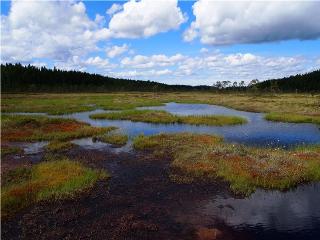Mar 27 2015
Drainage and management of pristine peatlands increase greenhouse gas emissions into the atmosphere. A recent study, based on a new, wide data set collected from northern peatlands indicates that particularly those peatlands which have been taken into agricultural use have significant warming impact on climate.
 Siikaneva peatland. Image: Janne Rinne
Siikaneva peatland. Image: Janne Rinne
The effects of peatlands taken into forestry are, on the other hand, less well known and depend on the original peatland type.
Draining a wetland for agricultural use causes twofold effects on the atmosphere: it decreases the high methane emissions typical to pristine wetlands, but increases emissions of nitrous oxide and carbon dioxide, resulting from the decomposition of old peat. The warming impact of increased carbon dioxide and nitrous oxide emissions exceeds the cooling impact caused by the ceased methane emissions. Although extra carbon is fixed into the cultivated crops, it will return rapidly back into the atmosphere.
In the present work, the researchers utilized the concept of radiative forcing in comparing the climatic effects of the different gases. By using this approach the researchers were able to take into account the different lifetime and warming efficiency of the gases.
The work was based on data from 29 peatland measurement sites located on northern hemisphere which belong to the global FLUXNET measurement network. Part of the sites also belong to the ICOS (Integrated Carbon Observation System) research infrastructure, the head office of which is located in Helsinki, Finland.